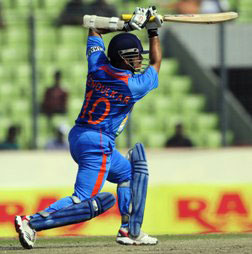 |
The irritatingly passionate debate whether Sachin Tendulkar should retire from international cricket is closely linked to the saga of how Indians turned him into a national icon. Deification is embedded deep into the collective South Asian psyche. We have a bewildering pantheon of gods, there is a propensity to turn cremation sites of mortals, extraordinary though their achievements are, into monuments.
From gods we ultimately become a tad alienated as our supplications do not lead to divine intercession, prompting some of us to turn away from them. However, our disappointment with flesh-and-blood gods provokes us to act of vengeance. It is we who assassinated Mahatma Gandhi. We pummel Jawaharlal Nehru more now than what we did in his life.
It is this phenomenon of deification which has turned Tendulkar the cricketing genius into Tendulkar the god of cricket. How dare he fail after we have worshipped him for 23 years! It is galling for us that his failure has coincided with India's precipitous decline in Test cricket. Aren't gods supposed to magically help us overcome odds?
No doubt, unharnessed popular expectations mounted tremendous pressure on Tendulkar. What else can explain the sudden dip in form as soon as he reached his 99th international century? Till then, he had been in fine fettle. On reaching his 100th international century against Bangladesh, Tendulkar said, "It's been a tough phase for me � I was not thinking about the milestone, the media started all this, wherever I went, the restaurant, room service, everyone was talking about the 100th hundred. Nobody talked about my 99 hundreds. It became mentally tough for me." Indeed, there couldn't be a more apt example of deification unravelling gods.
The debate over Tendulkar is in some ways redolent of our feudal mindset. The personality of the feudal lord was infused with certain charisma that made his subjects consider him worthy of unquestioning adulation. The subcontinent is the land where charisma is a defining factor � the Nehru-Gandhis are supreme in India, as are the Bhuttos and Sharifs in Pakistan, the Hasinas and Khaledas in Bangladesh and, to some extent, the Koiralas in Nepal.
Worship presumes accepting your own inferiority in relation to those who boast of seemingly exalted lineages or, as in the case of Tendulkar, are prodigiously talented. From them, we feel, flow our blessings. Our inferiority stems from the pervasive caste codes which have taught us to accept the inequality inherent in the social system.
Place the national psychology and Tendulkar's breathtaking talent against the backdrop of political ambience of the 1980s, in which he made his debut, and you will understand why we turned him into a national icon. The 1980s was the decade of pessimism. There had been a succession of grisly communal riots � Moradabad, Bhagalpur, and the anti-Sikh violence. In those days an organisation printed a poster with the photos of Kapil Dev (Hindu), Mohd Azharuddin (Muslim), Roger Binny (Christian) and Maninder Singh (Sikh) with a caption declaring, 'If we can play together, we can live together.' In 1989, the Bharatiya Janata Party initiated the movement to build a Ram temple at the site where the Babri Masjid stood. The nation was pushed to the edge.
In December 1989 Sachin Tendulkar, a callow 16-year-old and 223 days, stepped out on Pakistani soil to make his debut. In the second Test of his life he was struck on the nose, but went on to score 59. A dream had been born, of talent and aspiration. It was to take another three-four years for the dream to truly develop wings and soar high. By then, the Babri Masjid had been demolished and affirmative action in favour of backward social groups had bitterly divided the nation. In this gloomy scenario Tendulkar's majestic wielding of the bat papered, however ephemerally, over schisms.
Forgetting our own connivance in turning Tendulkar into a god, we have triggered a debate not only graceless but also deeply insulting to our own memory of pure bliss he brought to us. As a people we are notoriously fickle. We hailed Indira Gandhi as an incarnate of Durga and then pelted stones at her, only to vote her back to power three years later.
Yet a question remains: why didn't the crossing of the 100th-century milestone relieve the pressure on Tendulkar? Alas, it is difficult for a person to rediscover the earlier state of serenity once his mind learns fear and anxiety. Such foibles are habit-forming. Perhaps he now finds difficult to overcome his mind because he lacks the resilience of the young. Or perhaps he can still adjust to the gradual withering away of his powers.
Let Tendulkar bat without the fear that he might be asked to leave without singing his delectable swan song. Let us hope for an exceptional knock from him and then clamour he should bid adieu. Should such an innings prove elusive, he won't potter around, for it is impossible for Test cricket to sustain a Dev Anand, who continued to produce films for the love of it even though no one watched them. We owe this to Tendulkar, for bringing light and warmth in those gloomy years we lived in.



